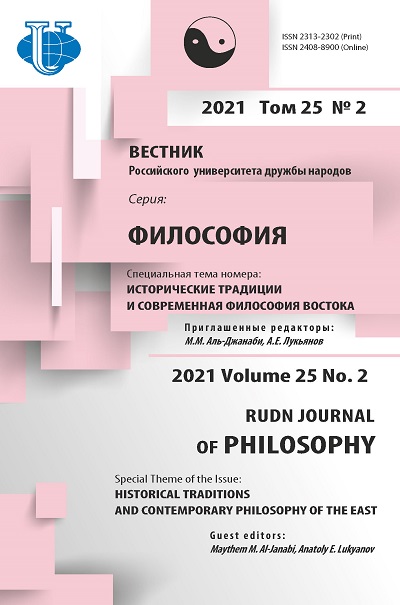Philosophical Value of the Confucian Treatise "Kong-Zi Jia Yu"
- Authors: Blazhkina A.Y.1
-
Affiliations:
- Institute of Far Eastern Studies RAS
- Issue: Vol 25, No 2 (2021): HISTORICAL TRADITIONS AND CONTEMPORARY PHILOSOPHY OF THE EAST
- Pages: 276-287
- Section: HISTORICAL TRADITIONS AND CONTEMPORARY PHILOSOPHY OF THE EAST
- URL: https://journals.rudn.ru/philosophy/article/view/26670
- DOI: https://doi.org/10.22363/2313-2302-2021-25-2-276-287
Cite item
Full Text
Abstract
This article reveals the philosophical value of the Confucian treatise "Kong-zi jia yu," it examines issues of the theoretical importance for the history of world sinology. In the historicо-philosophical tradition, this text has long been attributed to the Confucian scientist Van Su (3rd century), however, not so long ago the situation changed significantly. In the modern scientific community, disputes around the authorship and time of writing this treatise continue. The content of "Kong-zi jia yu" is composed of stories from the life of Confucius, his conversations with his closest students, as well as prominent political figures of that time. These conversations are philosophical dialogues, they concern the most important ontological, ethical, aesthetic and epistemological issues, such as: harmonization of the Tianxia on the basis of virtuous management, the philosophical need for ritual practice, cosmological device of the Tianxia, issues traditional for early Confucianism of a pedagogical and educational nature, moral self-improvement. The diverse theme of "Kong-zi jia yu" is a valuable source that reveals the essence of the philosophy of early Confucianism. Individual fragments of "Kong-zi jia yu" coincide with the classic Confucian monuments "Shang shu," "Lun yu," "Xiao jing," etc. Although "Kong-zi jia yu" for a number of reasons, is not considered a classic text of Confucianism, but it carries an enduring philosophical value. The study of "Kong-zi jia yu" seems to the author of this work to be an urgent scientific task, the solution of which can expand the arsenal of world philosophical knowledge, as well as contribute to the dialogue of the philosophical cultures of the East and West.
Keywords
About the authors
Anastasia Yur'evna Blazhkina
Institute of Far Eastern Studies RAS
Author for correspondence.
Email: myshashu@yandex.ru
Candidate of Sciences (Philosophy), Senior Research Associate
32, Nakhimovsky Av., Moscow, 117997, Russian FederationReferences
- Zhonghua lizhi wan. URL: http://www.zhlzw.com/lzsj/mz/803758.html [Accessed 13th October 2020]. (In Chinese).
- Ban Gu. Han shu, yi wen zhi. URL: https://www.gushiwen.org/gushiwen_ 48b00b5a15.aspx [Accessed 07th October 2020]. (In Chinese).
- Wang Shenyuan. Kongzi jia yu tong jie. Nanking: Ylin chubanshe; 2014. (In Chinese).
- Yang Chaoming. Kongzi jia yu de chengshu yu kekaoxin yangjiu. URL: http://bbs.tianya.cn/post-666-31315-1.shtml [Accessed 11th September 2020]. (In Chinese).
- Wang Guoxuan, Wang Xumei. Kongzi jia yu shi juan. Beijing: Zhonghua shuju; 2011. (In Chinese).
- Cheng Yubin. Zhonguo lidai zhuming jiajiao xuanze Kongzi jia yu. URL: http://www.guoxue.com/?p=23084 [Accessed 12th October 2020]. (In Chinese).
- Qingdai xueren liezhuan. URL: https://ctext.org/wiki.pl?if=gb&chapter=932818& remap=gb [Accessed 12th November 2020]. (In Chinese).
- Zhuzi yu lei. Quan yi bai sanshi qi zhanguo han tang zhuzi. URL: http://www.guoxue123.com/zhibu/0101/01zzyl/139.htm [Accessed 10th October 2020]. (In Chinese).
- Ning Zhenjian. Wujing zhengyu dui Kongzi jia yu yiwei jiuyu. Iss. 1. Beijing: Guoxue xuekan, Zhongguo renmin daxue zhuban; 2013. P. 8—17. (In Chinese).
- Pang Pu. Huashuo wu zhi san wu. Iss. 1. Beijing: Wen shi zhe; 2004. P. 71—76. (In Chinese).
- K'ung Tzŭ Chia Yü (The School Sayings of Confucius). Introduction. Translation of Sections 1—10, with critical notes. By Dr RP Kramers. Sinica Leidensia. Vol. VII Leiden: Brill, 1950 XII + 406 p. URL: https://books.google.ru/books?id=Xgw VAAAAIAAJ&printsec=frontcover&redir_esc=y#v=onepage&q&f=false [Accessed 13th November 2020].
- Paul Rakita Goldin. Rituals of the Way: The Philosophy of Xunzi. Chicago: Open Court; 1999. Р. 135. URL: https://www.academia.edu/36996761/Xunzi [Accessed 13th November 2020].
- Chtimaya kniga: Drevnekitaiskie texti i perevod "Shang shu" ("Shu jing") i "Malogo predisloviya" ("Shu xui"). Mayorov VM, Stejenskaya LV (eds.) Moscow: IDV RAN; 2014. (In Russian).
- Kongzi jia yu. URL: https://ctext.org/kongzi-jiayu [Accessed 16th November 2020]. (In Chinese).
- Shirley Chan. Cosmology, society and humanity: Tian in the Guodian texts. // Journal of Chinese Philosophy. 2011; (38). URL: http://www.academia.edu/4591130/Cosmology_ Society_and_Humanity_Tian%E5%A4%A9_in_the_Guodian_%E9%83%AD%E5%BA%97Texts_Part_I_ [Accessed 13th October 2020].
- Yang Chaomin. Zi Yuan shennian yu li yun de kexing wenti. URL: http://blog.sina.com.cn/s/blog_617467ae0100tkla.html [Accessed 20th October 2020]. (In Chinese).
- Ju Xuisheng. Kongzi jia yu zhongwen jingdian yibai jiu. Taibei: Zhou chuban chengbang wenhuashiye gufen yuxian gongsi; 2010. (In Chinese).
















